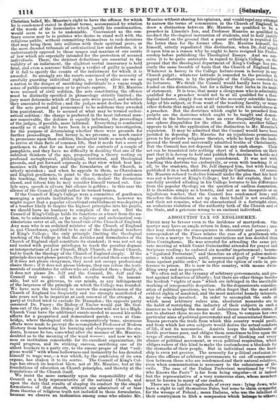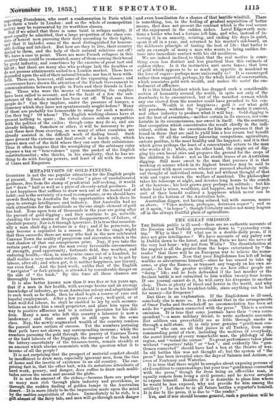ABSOLUTIST TAX ON ENGLISHMEN.
THERE may be favour even in the incidence of martyrdom. One martyr may have an ample return in fame, and even fortune ; ano- ther may undergo the consequences in obscurity and penury. A correspondent of the Times relates the case of a gentleman who has been a martyr to Protestant convictions not less decided than Miss Cuninghame. He was arrested for attending the same pri- vate meeting at which Count Guicciardini attended for prayer and Scripture reading; he endured six months' imprisonment ; became a "legalized Protestant," and therefore an object of police-molest- ation; which continued, until, pronounced guilty of "machina- tions against public order," he accepted the option of exile in pre- ference to prison. He is now in this country, with means dwin- dling away and no prospects. We often rail at the tyranny of arbitrary governments, and pro- test against infraction of liberty ; but there are other things besides the bookish "rights of man" which are infringed in the inevitable working of irresponsible despotism. In the dispassionate consider- ation of political questions, we too often forget that the most self- evident rights of mankind, and the most material homely interests, may be cruelly involved. In order to accomplish the ends at which most arbitrary rulers aim, absolutist monarchs are in the habit of restricting the industry of their subjects in such manner as to abridge the means of subsistence for whole states, if not to abstract those means for many. Thus, to compass her own particular aims of political government and of concentrated finance, Russia prevents the trade from which this country would profit, and from which her own subjects would derive the actual comforts of life, if not its necessaries. Austria keeps the inhabitants of fertile provinces poor, and obliges them sometimes to live upon the verge of starvation. It is the necessity of blocking out every chance of political movement, or even political respiration, which obliges rulers of this kind to make the customhouse a blockade for the stomachs of their people. But in individual oases the hard- ship is even yet greater. The necessity for political exclusion in- duces the officers of arbitrary governments to cut off communica- tion between those who are condemned and their natural relatives, even when communication is necessary to the subsistence of the exile. The case of the Italian Protestant mentioned by "One who Knows the Facts" is far from being singular—ft is indeed but the representative of a very numerous class, whose members must be known to many of our readers. There are in London vagabonds of every race : lying sews, who have a right to call themselves Poles, but none to claim sympathy for the wrongs of Poland ; mean holism, who use the intellect of their countrymen to filch a compassion which belongs to others ; aaponring Frenohmen, who court a condemnation in Paris which is to them a trade ' in London : and so the whole of cosmopolitan society 'mai be 'represented by its worthless classes. But if we admit that there is some taint in refugee society, it must equally be admitted, that a large proportion of the class con- sists ofianest men pursuing their duty according to their lights, and that it includes some of the most distinguished for honour- able feeling and intellect. But how are they to live, their country denied to them, and the help of their natural relatives out off? We have a case in point. There are more French refugees in this country than could be enumerated, many of them earning theirbread by great industry, and sometimes by the exercise of great tact and talent ; but there are many also who perhaps lack the faculties or do not possess attainments suited to a London market. These have depended upon the aid of their natural friends ; nor has it been with- held. There are, however, still some of the vaponring classes; and occurrences have drawn the attention of the French Government to communications between people in Paris and their friends in Lon- don. Those who were the means of transmitting the supplies have been called to account, and for the fault of a few the sub- sistence of the whole number has been cut off. What can these people do ? Can they implore, under the pressure of hunger, a clemency which they have not spontaneously sought before ? Many of them are probably too honourable to stoop for such a motive. Can they beg ? Of whom? The English working-classes have at present nothing to spare ; the richer classes seldom sympathize with the politics of the exiles ; though some may do so, and are already helping. Somehow or other, it will be necessary to pre- vent these men from starving, as so many of other countries are already assisted in the difficult work of finding bread. Such cases presentthe extreme and final result of a harsh rule, which throws men out of the field where they can earn their subsistence. Thus it often happens that the wrongdoing of the arbitrary ruler imposes a tax or " benevolence " upon the pocket of the English constitutionalist ; who thinks, in his simplicity, that he has no- thing to do with foreign powers, and least of all with the errors of Czars and Emperors.



































 Previous page
Previous page